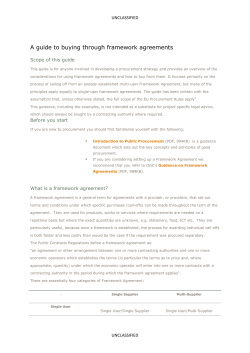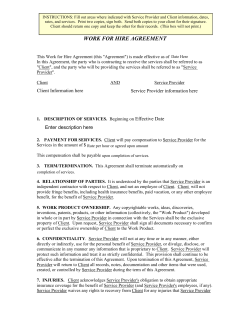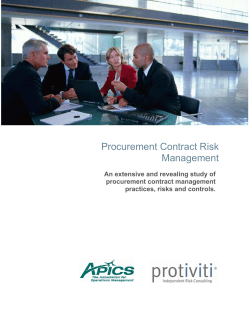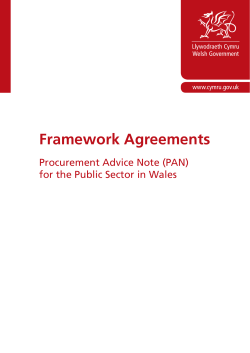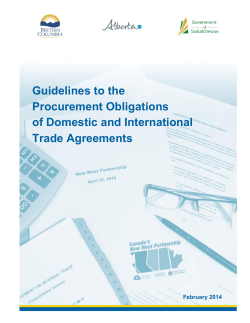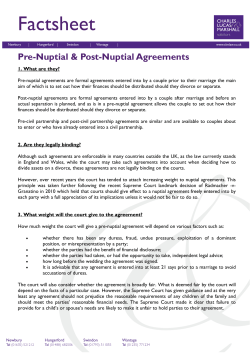
Procurement Policy Note – Public Procurement Rules, Development Agreements and s106
Procurement Procurement Policy Note – Public Procurement Rules, Development Agreements and s106 “Planning Agreements”; Updated and Additional Guidance. Information Note 12/10 30 June 2010 Issue 1. This note updates the guidance note issued by OGC in October 2009 on the applicability of the public procurement rules1 to “development agreements” between local authorities or other public bodies and developers. It sets out some of the circumstances which may reduce or increase the likelihood that a development agreement will be subject to the public procurement rules. 2. A summary of key points is at paragraph 55. 3. The initial guidance note of October 2009 was issued because of interest by local authorities and others in the context of European Court of Justice (“ECJ”) cases, in particular Case C-220 / 05 - Jean Auroux and others v Commune of Roanne (the “Auroux case”). 4. This update follows the ECJ judgment in another case related to public procurement and urban planning which has been of wide interest; Case C-451 / 08 Helmut Müller (“Helmut Müller”). In addition, guidance is given on the application of the public procurement rules to s106 agreements which takes into account Helmut Müller. Dissemination 5. Please You are requested to circulate this Procurement Policy Note (PPN) to any relevant contacts within your organisation, agencies, non-departmental public bodies (NDPBs) and any other bodies for which you are responsible. Contact 6. Enquiries about this paper should be addressed to the OGC Service Desk 0845 000 4999 servicedesk@ogc.gsi.gov.uk. 1 Reference to the “public procurement rules” or “the rules” is intended to mean the European directives governing public procurement (in particular 2004/18/EC and predecessor directives), the UK regulations implementing these directives, and applicable European Court of Justice and national case law. Introduction 7. This revised note is being issued at this time to keep stakeholders up to date with OGC’s thinking, but understanding and interpretation of the law in this area still remains subject to change, and this updated guidance is not definitive. In particular our assessment may develop following future information from the European Commission or from new case law. Therefore OGC may further revise this guidance, or issue additional guidance, in due course. 8. This guidance has been developed in consultation with Communities and Local Government. 9. It is emphasised that the European authorities are likely to take a purposive view of the activities and agreements entered into by a public body, and artificial arrangements intended to circumvent the application of the rules are unlikely to be persuasive. Public bodies should proceed with that in mind, and they are strongly recommended always to seek their own case-specific legal advice before entering into agreements. Background: Development agreements and public procurement 10. The European Commission has raised concerns that a number of “development agreements” which have been or may potentially be entered into, in the UK between public bodies and developers may have the characteristics of public works or public works concession contracts, and should therefore have been procured in accordance with the public procurement rules. In many of those cases the UK has argued in response that on the particular facts the public procurement rules do not apply. Although the Commission has very recently expressed its views on some of these cases, as yet we do not have the Commission’s decisions on all. Therefore OGC’s understanding is potentially subject to change depending on future arguments from the Commission. 11. OGC considers there to be no formal single definition of a “development agreement”, and the detailed circumstances and arrangements of each case are likely to be different. At its widest it can mean any agreement between a contracting authority and a third party about the use or development of land or property. Typically such agreements are between a local authority and a developer concerning either a greenfield site or regeneration of a brownfield area. Often, but not always, the same authority will have statutory planning responsibilities for the area. Statutory planning agreements and public procurement 12. Local authorities can enter into planning agreements under section 106 of the Town and Country Planning Act 1990 or into agreements in connection with the exercise of compulsory purchase powers. The question of whether there is a public works contract or public works concession contract in these situations requires careful analysis in each case by the local authority concerned. 13. As noted below the ECJ in Helmut Müller has drawn a distinction between public 2 Put briefly “delegated compliance” occurs where a developer itself undertakes the award-of-contract procedures under a mandate from the contracting authority, instead of the contracting authority directly undertaking the procurement. See paragraph 100 of the “La Scala” judgment. contracts and the mere exercise of land-use planning powers, which is relevant to the status of s106 agreements. The Annex to this guidance addresses the use of s106 agreements in connection with the grant of planning permission. Determining whether the public procurement rules apply to a development agreement 14. The applicability or otherwise of the public procurement rules to development agreements will depend on the particular facts of each case, and therefore universal guidance is not feasible. However, there are a number of matters which will be relevant in deciding whether a “development agreement” comprises a public works or works concession contract. In summary: Is a work or works required or specified by a contracting authority? Is there an enforceable obligation (in writing) on a contractor to carry out that work or works? Is there some pecuniary interest for carrying out this work (not necessarily a cash payment)? 15. If the answer to all those questions is “yes”, it is likely that agreement will be subject to the public procurement rules. Some of these issues are considered in more detail below. The Auroux case 16. This case concerned an agreement between the municipality of Roanne and a semi-public company SEDL, whereby the latter would undertake certain works, some of which would be put to public use and others would be sold to third parties. 17. The operative part of the ECJ judgment made clear that: A contracting authority does not necessarily have to become the eventual owner of a work for the contract to comprise a public works contract; For the purposes of deciding whether a contract exceeds the works threshold, the total value from the point of view of the tenderer is the relevant figure, including any sums to be received from third parties; The fact that both parties to an agreement are contracting authorities, and the second authority will procure any consequent contract to physically carry out the work in accordance with the public procurement rules, will not exempt the original agreement from the rules. 18. The circumstances of this case were that: The municipality of Roanne was the instigator and author of the project; Part of the works were intended to meet the specific needs of the municipality; Those parts of the works not intended to be transferred to the municipality were nevertheless part of the specified requirement; The municipality was to make a direct payment to SEDL for delivery of part of the works; The municipality was to make a contribution to the funding of the rest of the development, and guarantees to SEDL. In the event that there was a profit on the closing balance sheet of the development this would pass to the municipality; and It also appears that the agreement between Roanne and SEDL placed contractual obligations on SEDL to undertake the development activities. 19. On those facts, in OGC’s view there seems little reason to doubt that this should comprise a public contract, notwithstanding that part of the development was intended to be disposed of to third parties. Therefore the ECJ’s judgment on that point does not, in OGC’s view, provide a particularly contentious or surprising outcome. 20. Regarding the other points in the Court’s judgment,: i. That the total value should be seen from the point of view of a supplier appears to be consistent with the underlying purpose of the public procurement rules, bearing in mind that the agreement as a whole comprised a public works contract. (Note in OGC‘s view this does not necessarily mean that all developments containing both public contracts and private sector works will be required to be aggregated to assess the total value. This will depend on whether the two aspects are genuinely separable. This is discussed in more detail below). ii. That an obligation to advertise consequent contracts does not exempt an original contract from the rules, is consistent with OGC’s understanding of the rules. OGC understands that in some cases public bodies have undertaken a “delegated tendering”2 approach following the judgment in “La Scala” (Case C-399/98). However, the circumstances of each case must be considered carefully and a contracting authority cannot circumvent an obligation to adhere to the public procurement rules simply because its chosen contractor is itself also obliged to competitively procure relevant contracts in accordance with the public procurement rules. 21. Therefore OGC does not see the ECJ judgment in Auroux as fundamentally changing the applicability of the public procurement rules to development agreements. However, it has raised awareness of the issues with stakeholders. The Helmut Müller case 22. In brief, Helmut Müller concerned the sale of some land and redundant barracks, owned by a public authority, to a private sector body, which intended to carry out redevelopment works on that site. Those redevelopment works were subject to approval by the relevant municipality in whose area the land and buildings lay. A third party who had unsuccessfully sought to buy the land and buildings challenged the sale in the German courts, arguing that the sale of the barracks was subject to the public procurement rules, but that these rules had not been followed. 23. The German court referred a number of questions to the ECJ. These questions did not refer to the seller-buyer relationship but were directed at the relationship between the municipality with town planning powers, and the purchaser. 24. In summary the ECJ ruled that: A public works contract does not require that the works are materially or physically carried out for the contracting authority, provided that they are carried out for that authority’s immediate economic benefit. The latter is not met by the exercise of regulatory urban planning powers. In order for there to be a public works contract, there must be an enforceable legal obligation on the contractor to carry out the works (directly or indirectly). “Requirements specified by the contracting authority” is not met if a public body merely examines submitted building plans, or takes decisions in the exercise of its regulatory urban-planning powers. It is not possible for an authority to grant a works concession on land where the land owner already enjoys the right to exploit that land in compliance with applicable statutory rules. A public works concession contract cannot be granted for an unlimited duration. 25. The possibility should not be excluded that a two-phase award procedure in the form of a land sale which subsequently forms the subject of a works contract, comprises a unity subject to the public procurement rules. However, that might not be the case where one public authority sells land to an undertaking, even though another authority intends to award a works contract in respect of that land, but has not formally decided to award that contract. 26. In OGC’s view, the Helmut Müller judgment is helpful in clarifying the distinction between public contracts and the mere exercise by a public authority of planning powers. OGC also considers that the judgment is generally consistent with the analysis provided in the initial version of the current guidance note. It is also consistent with OGC’s understanding of the public procurement rules generally. The ECJ reaffirmed that it is not necessary for the contractor to physically carry out works itself for the public procurement rules to apply. An agreement will also be subject to the rules if the awardee is indirectly responsible for carrying out the work and subcontracts the actual activity to others. 27. However, the judgment was based on the specific questions put to the ECJ in the circumstances of the particular case. Therefore it does not definitively address all the issues and questions in this guidance, or all the circumstances which might lead to these issues arising. Some of the implications of the judgment are discussed further below under the relevant section of this guidance note. Definition of “Specified requirement” 28. Importantly for the application of the public procurement rules in the current context, a public works contract is defined as a contract “for the carrying out of a work or works for the contracting authority or… to procure… the carrying out for the contracting authority of a work corresponding to specified requirements” (Regulation 2 of the Public Contracts Regulations 2006). As such the nature of the work in question has to be that required by the contracting authority. 29. In Helmut Müller the ECJ ruled that “to establish that a contracting authority has specified its requirements, the authority must have taken measures to define the type of the work, or at the least, have had a decisive influence on its design”. Therefore the requirements have to be those of the contracting authority (i.e. the contracting authority has decided “what it wants”), even if the particular means of achieving those requirements is to be decided at a later point. Moreover those requirements need to be set out with sufficient clarity and precision in a contract notice or other subsequent documents for economic operators to make an informed decision about whether or not to express an interest in meeting those requirements. The requirements will also have to be sufficiently specific and detailed, and expressly referred to be in the contract itself, such that they can be legally enforceable. 30. In Helmut Müller the ECJ ruled that a public authority’s mere exercise of its planning powers does not satisfy the definition of a “requirement specified by the contracting authority”. OGC therefore understands that the setting of broad parameters for a development is qualitatively different from the type of specification necessary to comply with the requirements of the public procurement rules. National or local land-use planning policies, requirements or restrictions for a site or area would not in themselves comprise a requirement specified by the contracting authority. 31. A broad invitation, for example that a site should be developed in accordance with applicable national or local land-use planning policies for the land in question, but with the developer free to put forward its own intentions, proposals and specifications within those parameters, is unlikely in OGC’s view, to offer an adequate degree of precision to readily fall within the definition of a requirement specified by the contracting authority. 32. OGC therefore understands that where a contracting authority invites a developer or developers to submit their own proposals for the use or development of land or buildings, (competitively or otherwise) but without itself specifying the requirement, the public procurement rules may not apply, even if the contracting authority chooses the “winning” proposal (according to broad criteria pre-determined by the authority). In one particular case a Council invited developers to submit proposals to lease and develop a publicly owned building, and the Council expected such proposals to be consistent with the building’s “listed” status and with the local land use plans. The Council selected what it judged the most suitable proposal against a list of criteria advised to the developers. The Council agreed a long lease of the building, accompanied by a “development agreement” intended to safeguard the Council’s interests as freeholder. The specific function of the building and any works that had to be carried out were at no time specified by the Council. The conversion and use of the building were proposed by the developer and any works to convert the building to its own use will take place according to the developer’s design and specification, not to the Councils, as reflected in the agreement. It is unlikely that this comprised a public work or works concession to the specification of the authority, and thus was not subject to the public procurement rules. 33. Nevertheless, contracting authorities should take care to avoid a situation where a general invitation becomes or turns into a requirement to the authority’s specification. Moreover a requirement derived from the land-use planning regime would not be exempt from the application of the public procurement rules simply by virtue of its basis in a planning requirement, if it did in fact have the characteristics of a public contract. Transfer of land or property and the public procurement rules 34. The acquisition of land or existing buildings, or rights in or over land, by a public body is explicitly excluded from the scope of the public procurement rules (Regulation 6 (2) (e) of the Public Contract Regulations 2006). Moreover, the sale or lease of land or property by a public body is not within the scope of the public procurement rules, so a simple disposal of land is not caught as there is no acquisition (and thus no procurement) of any goods, works or services. Therefore the lease or sale of land by a contracting authority to a developer for the purposes of a development will not be subject to the public procurement rules unless this lease or sale contains or is accompanied by a requirement to undertake a work or works as defined in the rules. In Helmut Müller the ECJ reaffirmed that the simple sale of developed or undeveloped land does not constitute a public works contract. 35. Furthermore, in case C-331/92 “Gestion Hotelera” the ECJ ruled that “a mixed contract relating both to the performance of works and to the assignment of property does not fall within the scope of Council Directive 71/305/ EEC of 26 July 1971… (since succeeded by other Directives) if the performance of the work is merely incidental to the assignment of property”. As far as OGC is aware, there is no explicit definition of what would be considered incidental or ancillary (a recent ECJ ruling indicates this will depend on the actual facts and circumstances of the case), but a conservative and purposive approach would be prudent. So, for example, the works would probably not be subject to the rules if the scope and value of the works is small compared to the value of the sale, and would not have been pursued if the land was not being sold, and the main purpose of the sale was not to achieve those works. On the other hand the works would be unlikely to be “incidental” if they involved a wide range of works or a lengthy programme of works activity. 36. It should be noted that the Helmut Müller judgment left open that possibility that the sale of land and the subsequent award of a works contract on that land could be considered as a unity (i.e. two parts of the same contract). Therefore an artificial separation of the land sale from the works contract would not avoid the public procurement rules if the land sale was accompanied by or depended on a binding contractual obligation to carry out works on that land. Enforceable contract 37. In its decision in the case of “Flensburg” (see link below) the Commission took the view that a public works (or works concession) contract only arises if there is a specific legally binding contractual obligation to undertake the work or works. A sale or lease of land to a developer with the intention of both parties that the developer will undertake a particular work or works in accordance with the contracting authority’s needs is not in itself sufficient to engage the public procurement rules. This is so even if the contracting authority has a contractual right to reacquire the land if the work is not undertaken. http://europa.eu/rapid/pressReleasesAction.do?reference=IP/08/867&format=HT ML&aged=0&language= 38. The ECJ in Helmut Müller confirmed the necessity for a legally binding, enforceable agreement between a contracting authority and a contractor to carry out (or to have carried out) the works which form the subject of the contract. Otherwise there will not be a contract which engages the public procurement rules. 39. A “development agreement” between a contracting authority and a developer which sets out the intended nature of the proposed development, is therefore unlikely to constitute a contract subject to the public procurement rules unless the developer is placed under a binding obligation to carry out at least part of the development. 40. Further, if the developer is contractually entitled to decide unilaterally to promote a different usage of its own proposing (subject to planning consent), to delay the development, or to transfer the land in question to a third party, without breaching a contractual obligation, it is unlikely that the agreement will constitute a public contract subject to the public procurement rules. 41. Of course, as noted below, the Commission is likely to take a purposive view of all the relevant agreements between the authority and the developer. Thus hiving-off a contractual obligation to carry out a development into a separate agreement from the land transfer itself would not defeat the application of the rules. Development agreement ancillary to a lease 42. OGC considers that a development agreement which accompanies a lease might not be subject to the public procurement rules. Where a contracting authority leases land or property to a developer, to be developed according to the intentions of the developer (and not to any specified requirements of the authority), that lease is not of itself a public contract. The payment of rent to the authority by the developer, (who in turn may collect rents from sub-tenants), is unlikely to comprise pecuniary interest for the supply of goods, works, or services. So if that development agreement only sets out certain matters and obligations as to how the developer will undertake its intention as lessee, in order to safeguard the interests of the authority as lessor and freeholder that agreement does not thereby become subject to the public procurement rules. Building licences 43. OGC understands that on occasion, as an alternative to a development agreement, public authorities enter into a building lease or building licence with the purchaser/ developer for the duration of the construction period. This provides a means for the public authority to retain the freehold of the site (and ultimate control) to ensure that the purchaser’s construction activities comply with specific land obligations. Once the developer has demonstrated compliance, the freehold is transferred. 44. The applicability or otherwise of the public procurement rules in such cases may depend on the specific circumstances. However, if the purpose of the licence is to ensure that the purchaser does not go back on its own intended activities a licence probably does not of itself give rise to a contract subject to the public procurement rules (although adopting the use of building licence in an attempt to avoid application of the public procurement rules would not succeed). Mixed Land Ownership 45. Where a proposed or intended development includes a mixture of land or property owned by the authority and land owned by a developer or third party, the potential application of the public procurement rules may depend on the specifics of the proposed arrangement. If the authority simply intends to sell or lease land or property to the developer to be incorporated into the latter’s intended development that is also unlikely of itself to give rise to obligations under the public procurement rules unless that sale/lease also imposes works obligations on the developer. 46. Where part of the activity within an overall development is likely to have the characteristics of a public contract, the authority may wish to consider competitively letting a separate contract or series of contracts for those elements of the development, distinct from any development agreement for the rest of the development (see below). Developments potentially including a public contract 47. On occasion a public body may wish to enter into a development which itself is unlikely to be subject to the rules (as it falls within some of the circumstances set out above) but where the authority also has associated requirement(s) which may comprise a public procurement. For example, an authority may wish to lease property to a developer, to be developed according to the developer’s proposals, but where the property in question currently includes a building occupied or used by the authority. The authority may therefore have a requirement that a replacement facility is provided, perhaps elsewhere. 48. It is likely that the work for the replacement facility would comprise a public works contract if it is work to be done to the authority’s required specification, with a contractual obligation to construct it, and for some form of consideration. It would therefore be potentially subject to the public procurement rules. Public bodies are therefore recommended to pursue the construction of such a requirement as a separately-procured activity from the intended land transfer and associated development agreement. On the other hand, if the specific circumstances make it impracticable to achieve such a separation and the works to the authority’s requirement are contractually and operationally inseparable from the rest of the project, there are likely to be doubts as to whether the agreement(s) as a whole will fall outside the public procurement rules. 49. A similar case might arise where an authority intends to sell land to a developer for housing but retains a continuing interest in the development of the site because the authority is to be entitled to allocate tenants to a proportion of the housing. If the developer is placed under an obligation to undertake the works to an agreed specification, the agreement may comprise a public works or public works concession contract, even if the specification was arrived at with the assistance of the developer. Direct economic benefit 50. The issue of “direct economic benefit” discussed by the ECJ in Helmut Müller may also be relevant. As noted above the ECJ ruled that a public contract would not arise unless the contracting authority receives a direct economic benefit. The judgment describes certain situations which would comprise direct economic benefit. These include: The contracting authority is to become owner of the work or works; The authority is to hold a legal right over the use of the works, to make them available to the public The authority derives economic advantages from the future use or transfer of the work, has contributed financially to the work, or has assumed economic risks in case the works are an economic failure. 51. It may not be immediately clear why a financial contribution or assumption of economic risk by the contracting authority comprises a “direct economic benefit”. However the Advocate General’s opinion in this case indicates that it is in compliance with the fundamental principle of the Directive that “where public authorities intend to employ public resources, the selection of the persons who are to receive those resources should be accompanied by the guarantees provided in the Directive”. 52. As noted above, the ECJ ruled that a direct economic benefit does not arise where the purpose of the works is to fulfil an objective in the public interest such as development or coherent planning, simply through the exercise of statutory land use planning powers. 53. Although the ECJ has ruled that direct economic benefit is required, and has identified a number of situations or criteria which will demonstrate such benefit, it is not wholly clear from the judgment where the boundary lies in all specific circumstances. It will be evident if the contracting authority is to become the owner of the work. It may also be relatively unproblematic to decide whether a contracting authority has a legal right over the use of the works in order that they can be made available to the public, has contributed financially to the works, or assumed an economic risk. The most difficult issue may be to decide whether the authority derives economic advantages from the future use or transfer of the work. 54. As an example, OGC understands that a requirement that a certain proportion of housing in a development is to be “affordable” (as defined in government guidance) would comprise an objective in the public interest. Such a requirement is based on broad public policy principles which govern land use planning and is not in itself a direct economic benefit to the public authority, as it does not give the public authority any rights over the use of that affordable housing. Moreover, in such a case, it is unlikely that the contracting authority will have “specified the requirement” within the definition discussed above. Therefore such a requirement in itself would not give rise to a public contract, and would not be subject to the the public procurement rules. However, as noted above, if an authority also required the rights to nominate tenants to some of that housing, (or required some other rights over the use of that housing), that requirement for nomination rights might well comprise a direct economic interest and would potentially give rise to a public contract. Summary 55. Based on its understanding of current relevant case-law and the Commission’s decisions, OGC suggests that a “development agreement” between a public body and a developer may be less likely to comprise a public works or works concession contract, if it meets some of the following characteristics: a) The proposed development (or a significant part) is to be undertaken at the initiative and autonomous intention of the developer. (This may be particularly likely if the developer already owns or has control of land to be developed); b) The development agreement is ancillary or incidental to a transfer or lease of land or property from the authority to the developer, and is intended to protect the interests of a contracting authority which is the lessor or otherwise retains an interest in the land or property; c) The development agreement is based on proposals put forward by the developer, rather than requirements specified by the contracting authority, albeit that these proposals may be sought, and the “winner” chosen by the authority; d) There is no pecuniary interest passing from the contracting authority to the developer as consideration for undertaking the development, either through direct payment or indirectly, for example by the assumption of obligations such as contributions towards project finance or guarantees against possible losses by the developer; e) The development agreement does not include specific contractually enforceable obligations on the developer to realise a work or works (even if that work or works is recognised as being the general intent of the parties to the agreement). f) The development does not consist of or contain works for the direct economic benefit of the contracting authority. g) The involvement of the contracting authority consists only in the exercise of statutory land-use planning powers. 56. Where a development agreement falls outside some or many of these parameters there may be a greater likelihood that the agreement has the characteristics of a public works or public works concession contract. 57. The European Commission (and the ECJ) can be expected to look at the totality and overall nature of the relevant agreements between a contracting authority and an economic operator in relation to a development, to decide whether the public procurement rules apply. Any artificial arrangements intended to circumvent the application of the public procurement rules are therefore likely to attract challenge. 58. Of course, the facts of each intended development and the precise relationship between the parties are likely to be different at least in detail in each case, and generic guidance must be applied in the light of the specific circumstances. Public bodies are therefore strongly recommended to obtain their own legal advice before proceeding. Annex Section 106 Agreements 1. It will be evident from the main body of this guidance that a number of conditions need to be satisfied in order for the public procurement rules to apply to an agreement. In addition, it will be a question of fact in each case whether those conditions are satisfied. 2. Nevertheless, in the light of the judgment in Helmut Müller , it is possible to say that a section 106 agreement for works entered into in connection with the grant of planning permission will not normally be subject to the public procurement rules. This is so even though such agreements necessarily possess some of the characteristics of a “public works contract”. They will be in writing and with a contracting authority (i.e a local planning authority), works will often be part of their subject-matter (because of an obligation under section 106(1)(a) or (b) of the Town and Country Planning Act 1990) and there will be a variety of means to enforce the obligations relating to works. 3. The reasons for this are as follows: a. The public procurement rules apply in respect of “public contracts”, which are contracts for “pecuniary interest”. In other words, for the rules to apply there must be consideration paid or payable to the contractor on account of (in this case) the execution of works. Where a section 106 agreement is entered into no consideration will normally be provided by the local planning authority. In particular, in the light of Helmut Müller, the grant of a connected planning permission should not be treated as “pecuniary interest”. It is rather the mere exercise by a local planning authority of its regulatory planning functions. b. One pre-requisite of a public works contract is that the works in question are “a requirement specified by the contracting authority”. As established in the Helmut Müller decision, a public authority’s mere exercise of its planning powers does not fulfil this requirement. Where there is no direct economic benefit to the local planning authority, the entering into of a section 106 agreement by that local planning authority which contains an obligation to carry out works, should only constitute the exercise of its regulatory, town planning powers. Its purpose will be to secure the proper planning outcome when granting permission. c. A public works contract also only arises if there is a specific, legally binding contractual obligation to undertake work or works. That requirement will not normally be satisfied in the case of a planning obligation to carry out works because ordinarily the obligation will be conditional upon some voluntary act connected with the implementation of the planning permission, and commencement of the development for which planning permission has been granted. 4. However, the arrangements which may be entered into by local planning authorities can be complex, both in terms of the possibility of additional connected agreements to a section 106 agreement, and also the breadth of what can be provided for in one agreement using the powers in section 106 (and other powers). Therefore, it is important that, in each case. the intended arrangements are reviewed in the light of the public procurement rules to establish whether it is proper to conclude that the public procurement rules do not apply because there is no pecuniary interest, no direct economic benefit and no legally binding contractual obligation. Policy and Standards OGC OGC 1 Horse Guards Road, London SW1A 2HQ About OGC The OGC logo is a registered trademark of the Office of Government Commerce in the United Kingdom and other countries. OGC Service Desk OGC customers can contact the central OGC Service Desk about all aspects of OGC business. The Service Desk will also channel queries to the appropriate second-line support. We look forward to hearing from you. You can contact the Service Desk 8am – 6pm Monday to Friday: T: 0845 000 4999 E: ServiceDesk@ogc.gsi.gov.uk www.ogc.gov.uk Press enquiries T: 020 7271 1318 F: 020 7271 1345 © Crown copyright 2010
© Copyright 2025
